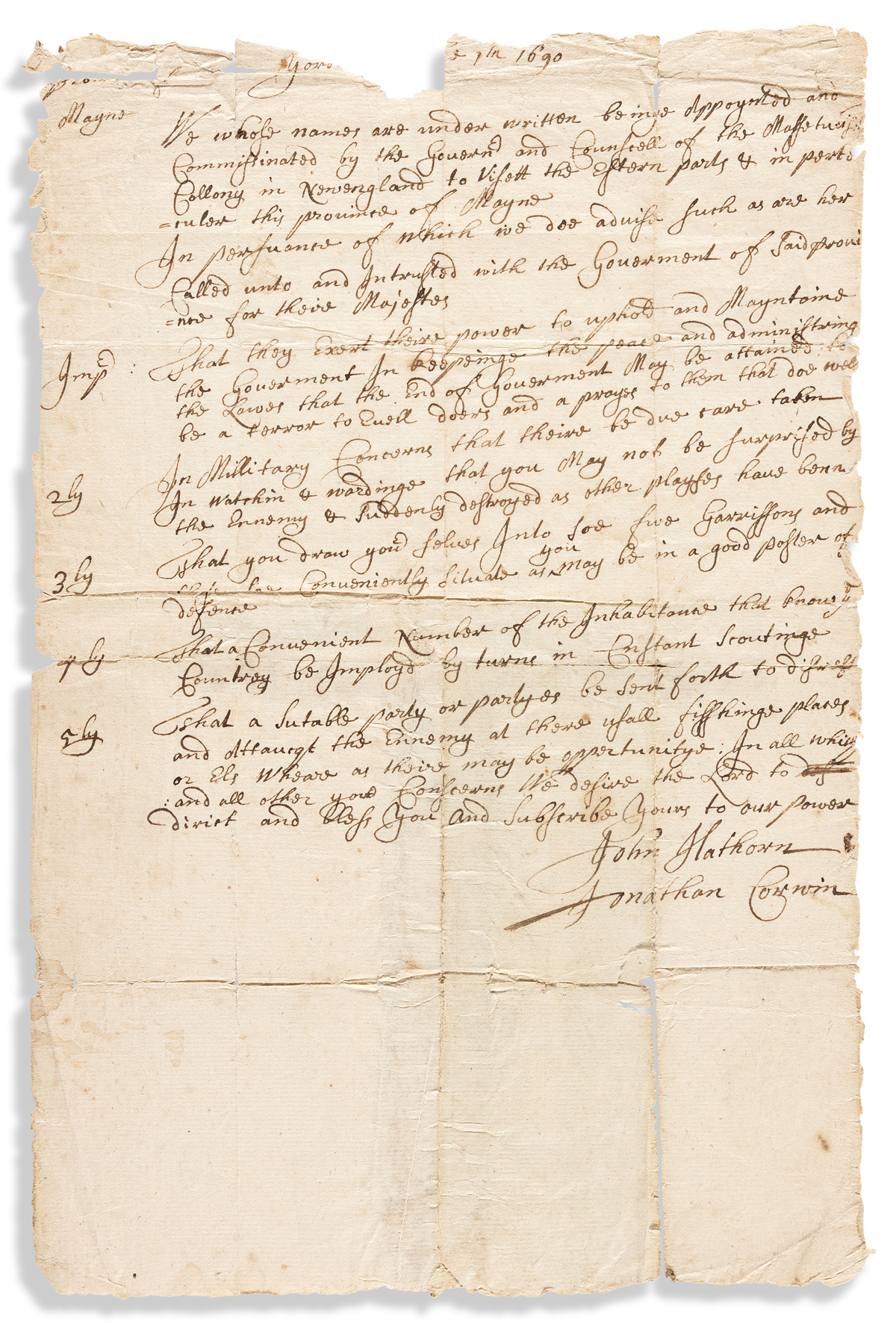Sale 2564 - Lot 196
Unsold
Estimate: $ 5,000 - $ 7,500
ATTACK THE ENEMY AT THEIR USUAL FISHING PLACES (COLONIAL WARS.) Order regarding protection of the Maine frontier, from two future Salem witch trial judges. Manuscript document, 11 3/4 x 7 3/4 inches, in unknown contemporary hand; worn with loss to dateline, separations at folds with two early tape repairs on verso. With typed transcript. York, ME, [1 May] 1690
Additional Details
In 1690, Maine was a frontier part of the colony of Massachusetts, and the front line in King William's War. The region was subject to frequent raids by the French and their Indian allies. Just in the preceding year, English settlers had suffered heavy losses at Dover, NH; Saco, ME; Pemaquid (Bristol), ME; Falmouth (Portland), ME; and Salmon Falls (Berwick), ME, with many taken prisoner. The frontier was rapidly becoming depopulated of Englishmen, pushing the front line ever closer to Boston. This document is a report by two important citizens of Salem, MA who were sent to Maine to advise on defenses.
The commissioners offered a 6-point plan to local Maine officials. First, they urged a need to maintain civil government, in order to serve as a "a terror to evell doers and a prayse to them that doe well." They also urged that "in millitary concerns that theire be due care taken in watchin & wardinge that you may not be surprised by the enemy & suddenly destroyed as other playses have been. That you draw your selves into soe fewe garrissons and soe conveniently situate as you may be in a good poster of defense. That a convenient number of the inhabitance that know ye countrey be imployed by turns in constant scoutinge. That a sutable party or partyes be sent forth to distress and attauqt the ennemy at theire usuall fisshinge places or els wheare as theire may be oppertunitye."
In short, they urged that the few remaining inhabitants gather together in small well-fortified groups, from which they could take the offensive against Indians with surprise sorties. The advice was either not heeded or insufficient. Just two weeks later came the Battle of Falmouth, in which 200 inhabitants of what is now Portland were massacred, and a hundred more taken captive.
The two commissioners who delivered this report would very soon play a bigger role in history as judges in the Salem witch trials of 1692. John Hathorne (1641-1717), great-great-grandfather of author Nathaniel Hawthorne, and Jonathan Corwin (1640-1718) worked together to take the preliminary testimony which launched the case; Corwin's house is now a museum known as the Witch House. The horrors of war so nearby on the frontier are sometimes cited as part of the context for the witch hysteria.
Another version of this manuscript (with nearly identical content but a different set of creative phonetic spellings) is transcribed in under the title "Report of John Hathorn and Jonath. Corwin, commisionated to visit the eastern parts," in Documentary History of the State of Maine, Volume 5, pages 92-93. While the date is partially illegible in the present document, it is given there as 1 May 1690.
This report is a powerful reminder of the fear which gripped the frontier of northern New England during this period, with an unusual connection to the witch trials which began less than two years later.
The commissioners offered a 6-point plan to local Maine officials. First, they urged a need to maintain civil government, in order to serve as a "a terror to evell doers and a prayse to them that doe well." They also urged that "in millitary concerns that theire be due care taken in watchin & wardinge that you may not be surprised by the enemy & suddenly destroyed as other playses have been. That you draw your selves into soe fewe garrissons and soe conveniently situate as you may be in a good poster of defense. That a convenient number of the inhabitance that know ye countrey be imployed by turns in constant scoutinge. That a sutable party or partyes be sent forth to distress and attauqt the ennemy at theire usuall fisshinge places or els wheare as theire may be oppertunitye."
In short, they urged that the few remaining inhabitants gather together in small well-fortified groups, from which they could take the offensive against Indians with surprise sorties. The advice was either not heeded or insufficient. Just two weeks later came the Battle of Falmouth, in which 200 inhabitants of what is now Portland were massacred, and a hundred more taken captive.
The two commissioners who delivered this report would very soon play a bigger role in history as judges in the Salem witch trials of 1692. John Hathorne (1641-1717), great-great-grandfather of author Nathaniel Hawthorne, and Jonathan Corwin (1640-1718) worked together to take the preliminary testimony which launched the case; Corwin's house is now a museum known as the Witch House. The horrors of war so nearby on the frontier are sometimes cited as part of the context for the witch hysteria.
Another version of this manuscript (with nearly identical content but a different set of creative phonetic spellings) is transcribed in under the title "Report of John Hathorn and Jonath. Corwin, commisionated to visit the eastern parts," in Documentary History of the State of Maine, Volume 5, pages 92-93. While the date is partially illegible in the present document, it is given there as 1 May 1690.
This report is a powerful reminder of the fear which gripped the frontier of northern New England during this period, with an unusual connection to the witch trials which began less than two years later.

Exhibition Hours
Exhibition Hours
Aliquam vulputate ornare congue. Vestibulum maximus, libero in placerat faucibus, risus nisl molestie massa, ut maximus metus lectus vel lorem.


